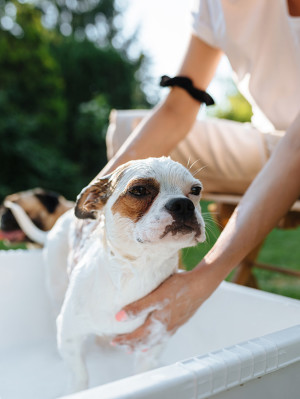Your Itchy Dog Deserves Relief—Here’s What to Do
Thankfully, there are treatments. But first, you have to figure out why they have an itch to scratch.

Share Article
In This Article:
Why Is My Dog Itching? 13 Solutions to Relieve Your Dog’s Itchy Skin When to See a Vet for Your Dog’s Itchy Skin
There’s no denying when your dog has an itch. Maybe it starts with that scratchy sound every dog parent fears, with obsessive licking and chewing which seem to get more frenetic as the night wears on. Or maybe your pup can’t make it down the street without stopping multiple times to scratch behind their ears, chew at their belly, and/or scoot their butt along the sidewalk.
When a dog is incessantly licking, scratching, biting, and chewing to the point of interfering with their normal activities, it’s important to help them find relief ASAP. Read on to learn why your dog is so itchy, plus what you can do to soothe their irritated skin.
Main takeaways
Itchy skin can have many underlying causes, all of which require different treatment approaches.
It is important to seek veterinary attention to determine the cause of your dog’s itchiness and target the most effective treatments.
There are home remedies that can help relieve mild itches too and these should be used in consultation with your vet.
Why is my dog itching?
The medical term for itchiness is “pruritus,” and it’s one of the most common reasons people take their dogs to the vet.

There are numerous causes of pruritus. Some of the most common causes include skin parasites like fleas, ticks, and mites; skin infections; dry skin; canine allergies; hormonal changes; autoimmune conditions; and certain types of cancer. One of the challenges with skin disease is that many times, a dog will have more than one of these problems at the same time, compounding their itchiness and general discomfort.
With itchy skin being such a vast issue, it’s no wonder that veterinary dermatologists have become vital in the care and treatment of more complex canine skin disorders. But the good news is that, unless the condition is extreme, most dogs won’t need to see a specialist to get relief.
How to identify itchy skin in dogs
Dogs may show their discomfort in many ways, including some that don’t seem obvious at first. Here are some of those signs.
Frequent scratching: The main sign of an itchy dog is that they are scratching frequently, to the point where they may not be able to sit still or rest. Dogs usually scratch their itches by using their paws to rub at their skin or sometimes using their mouth to lick and bite at itchy skin. Most pet parents have probably witnessed this at some point.
Rubbing against things: Sometimes dogs might show their itchiness by rubbing their faces and ears against furniture, the floor, or even you. They might also shake their head frequently or scoot their butt along the floor, especially if their itchy skin is related to problems like allergies which can lead to ear infections and anal gland problems too.
Fur or skin abnormalities: You might also notice physical changes in your dog’s skin and fur. These include: hair loss; patches of skin that look red, scaly, swollen, dry and flaky; or greasy and oily skin and fur. They may also develop a bad odor if their skin is infected.
If you see any of the above fur or skin abnormalities, it is important to see a vet before trying any home remedies, to prevent the development of a serious complication. However, if your dog has a milder case of itchy skin — and no signs of damage to their skin or fur — you may want to try some of the below, at-home treatments to make them more comfortable.
13 solutions to relieve your dog’s itchy skin
These are steps you can take at home to help relieve your dog’s itchy skin and make them more comfortable. Not all of these methods will be effective, depending on what is causing your pup’s particular itch, so be sure to monitor them closely and see a vet if they are not improving.
A soothing bath
Use lukewarm water and a soothing pet shampoo, such as an oatmeal-based colloidal or medicated shampoo prescribed for your pup.
Flea-and-tick prevention
Make sure your pup is receiving flea-and-tick preventatives year-round. If you think you may have missed some months, be sure to check your pup thoroughly for fleas and ticks and get back on track with regular prevention.
An antihistamine
If your vet gives you the go-ahead, you may be able to try an over-the-counter antihistamine like Benadryl to relieve your pup’s itch.
Apple cider vinegar soaks
Apple cider vinegar diluted 1:1 with water can be used to make a mild antimicrobial solution. This can be helpful as a foot soak for dogs who develop yeast overgrowth between their paw pads or to clean skin folds. It will not cure infections in the skin, however, and should not be applied to open wounds or raw skin, because it can burn.
Coconut oil
Coconut oil contains fatty acids which may support healthy skin and fur. However, there is no conclusive research on whether coconut oil directly helps with itchy skin. Due to the high fat content, if dogs ingest it, coconut oil can lead to weight gain, digestive upset, and/or pancreatitis. Be sure to speak with your vet before testing this one out.
A chamomile soak
Chamomile has been studied for its potential antimicrobial and anti-inflammatory properties. You can try applying a chamomile tea solution to skin that has mild redness or itchiness — just make sure the water has cooled completely.
Oils and nutritional supplements
Several supplements can support healthy skin and fur, and may reduce itchiness. This includes products with omega-3 fatty acids, such as fish oils.
Probiotics
Probiotics are the beneficial bacteria that colonize the microbiome of the body. They are commonly found throughout the body, including on the skin as well as in the digestive tract. Supplemental probiotics can be mixed into your dog’s food each day to help restore the balance of beneficial bacteria to the skin, which may enhance immune function and reduce inflammation.
Regular baths
Soothing baths can make a big difference in your pup’s itchiness, and medicated baths may be a regular part of their treatment plan. Just don’t bathe your pup too often: Frequent baths with detergent-based shampoos can strip the skin of its natural oils, drying out the skin and fur, making dogs itchier.
Hydration
A well-hydrated pup will have well-hydrated skin, which can help support healthy skin-and-coat quality. Try adding moist food to their diet if they only eat kibble, or even mix some broth into their food to increase fluid consumption.
Hypoallergenic dog food
This can be a crucial step for dogs with food allergies, so be sure to consult your vet if your dog seems to have chronically itchy skin and other symptoms consistent with a food allergy. It’s important to find the right diet for dogs with skin allergies, and not all diets labeled as hypoallergenic actually meet the strict requirements needed to make them effective (nor do they avoid cross-contamination). In many cases, true hypoallergenic diets are only available by prescription.
Avoid blow dryers
Blow dryers tend to dry out the skin, which can lead to additional itchiness. Whenever possible, gently towel-dry your pup, and let them air dry the rest of the way. If you do need to dry them off more thoroughly, be sure to use the cooler setting on the dryer, and hold it at least six inches away from your dog’s skin to protect them from heat damage.
Booties and onesies
If your dog’s itchy skin seems to recur seasonally and/or flares up after walking or playing in certain places, your dog may have environmental allergies. You may be able to reduce this reaction by using booties and/or a onesie to keep your dog’s skin from coming into contact with allergens.
When to see a vet for your dog’s itchy skin
It’s always a good idea to consult a vet if your pup seems really itchy and uncomfortable. They can guide you toward a specific diagnosis as well as a targeted treatment that may bring prompt relief.
This is especially important in cases where the itchiness lasts more than a few days and/or there are signs of damage to the skin or fur — including a bad odor, bumps, redness, flaking skin, hair loss, and/or open wounds. When these signs are present, your dog will need treatments aimed at correcting the underlying problem and healing their skin.
Prescriptions for an itchy dog’s skin
There are many medications that are extremely effective at treating itchy skin and its underlying causes. Your vet may prescribe one or more medications based on your dog’s specific diagnosis. They include antihistamines, antibiotics, immune modulators, immunosuppressants, steroids, topical sprays, and/or medicated shampoos. Be sure to use the products exactly as directed.
Bottom line
It is important to keep in mind that without addressing the underlying cause of your pup’s itchy skin, many of these topical products are not going to make a dramatic difference in their condition. Most are best used as complimentary treatments in combination with prescription medications from your veterinarian.
Dogs with chronic itchy skin may require some long-term lifestyle changes with their diet and/or activities to avoid allergens and keep them feeling their best.
Chronic skin disease can feel very frustrating for pet parents since it requires long-term management solutions and rarely has a quick fix.
If you feel as if you aren’t making progress, look for a veterinary dermatologist in your area who can provide more advanced testing and treatment options.
FAQs
How long does it take for pet skin allergies to go away?
A skin allergy never goes away completely. They are a chronic condition that usually has to be managed for a dog’s whole life. However, the itchiness should improve and/or completely resolve with the right combination of treatments and lifestyle changes.
How do I make a homemade itch cream for dogs?
It is important to check that all ingredients you intend to use on your dog are safe and nontoxic to them. (Keep in mind that anything you put on their skin may be ingested when they lick themselves.) It may be best to consult a naturopathic or alternative-medicine veterinarian to get a recipe that is both safe and effective for dogs.
Which ointment can I put on my dog for itching?
Depending on the underlying cause of your pup’s itch, different medications may be appropriate. You can start by bathing them with a dog-safe, oatmeal-based shampoo. You should always consult a vet before applying an ointment, because some may contain ingredients that are toxic to dogs if ingested.
Which human medicines can I give my dog for itching?
You should always consult your veterinarian before giving your dog any medication. While some medications, such as antihistamines, may be okay for some dogs, they may be harmful for others.
References
Collins, Brian. “Atopic Dermatitis.opens in new tab” Cornell Canine Health Center. 2024.
Ghubash, Rudayna. “Approach to the Pruritic Dogopens in new tab.” DVM 360, August 2010.
Reynertson, Kurt, et al. “Anti-inflammatory activities of colloidal oatmeal (Avena sativa) contribute to the effectiveness of oats in treatment of itch associated with dry, irritated skinopens in new tab.” Journal of Drugs in Dermatology, vol. 13, no. 1, January 2015, pp. 43-48.
Tresch, Milena, et al. “Medicinal plants as therapeutic options for topical treatment in canine dermatology? A systematic review.opens in new tab” BMC Veterinary Research, vol. 15, no. 1, 27 May 2019, pp. 174.

Dr. Amy Fox, DVM
Amy Fox, DVM is a small animal veterinarian in New York City with over thirteen years of experience in a mixture of general practice, emergency medicine, and shelter medicine. A lifelong animal lover, Dr. Fox studied biology in college and then worked as a veterinary nurse before pursuing veterinary school at Cornell University. Her expertise includes surgery, dentistry, and management of chronic conditions, and she is interested in toxicology, pain management, nutrition, care of senior pets, and educational outreach. Dr. Fox also enjoys writing about veterinary medicine and teaching, and her work has previously appeared in Spruce Pets. In her free time, she loves to cook, garden, go for long runs, and hang out with her goofy mixed-breed dog May, who provides never ending comic relief!
Robert J. Silver, DVM
Robert Silver, DVM, founder of Boulder's Natural Animal: A Holistic Wellness Center, is also a certified veterinary acupuncturist. He received his DVM from Colorado State University's College of Veterinary Medicine in 1982.
Related articles
![Woman making dinner for her dog at home.]()
Best Food for Dogs With Allergies
Because no one deserves to be uncomfy.
![Beagle eating food out of a dog bowl]()
Supplements Are Going to the Dogs
An integrative vet helps suss out what’s beneficial versus what’s bogus.
![A dog scratching itself among the leaves outside.]()
Immunotherapy Can Be the Solve For Your Dog’s Allergies
If allergens were to ask, “Am I the drama?,” the answer would be yes.
Can Dogs Get Skin Tags? Causes and Treatments
Yes, and here’s why you shouldn’t pick at them, even if you want to.
![Little dog getting showered by his owner in the backyard.]()
How to Treat Dog Skin Diseases at Home
And how you might safely give your pup immediate relief.







